You might not be aware that using the right rear differential oil can greatly impact your Ford Escape's handling and overall longevity. Choosing the correct oil not only enhances performance but also mitigates wear and tear on critical components. With so many options available, it's crucial to know which oils have earned the trust of experts for ideal results. Let's explore the top five recommendations that can help you maximize your vehicle's efficiency and durability.
Need tools for your project? Toolbox, a tool rental marketplace, might be worth a look.
Quick Takeaways
- 80W90 Conventional Gear Oil enhances differential performance, reduces clutch chatter, and is effective for high mileage differentials.
- Valvoline SynPower SAE 75W-140 offers excellent thermal stability, rust protection, and is compatible with conventional lubricants.
- Valvoline High Performance SAE 80W-90 provides superior protection for hypoid differentials, minimizing gear wear and improving performance under heavy use.
- Always confirm oil compatibility with Ford Escape specifications, particularly API GL-4 or GL-5 standards and recommended viscosity ratings.
- Synthetic oils generally offer better thermal stability and longer change intervals, while conventional oils may suffice for standard driving conditions.
3 Qt. 80W90 Conventional Gear Oil with Friction Modifier Additive
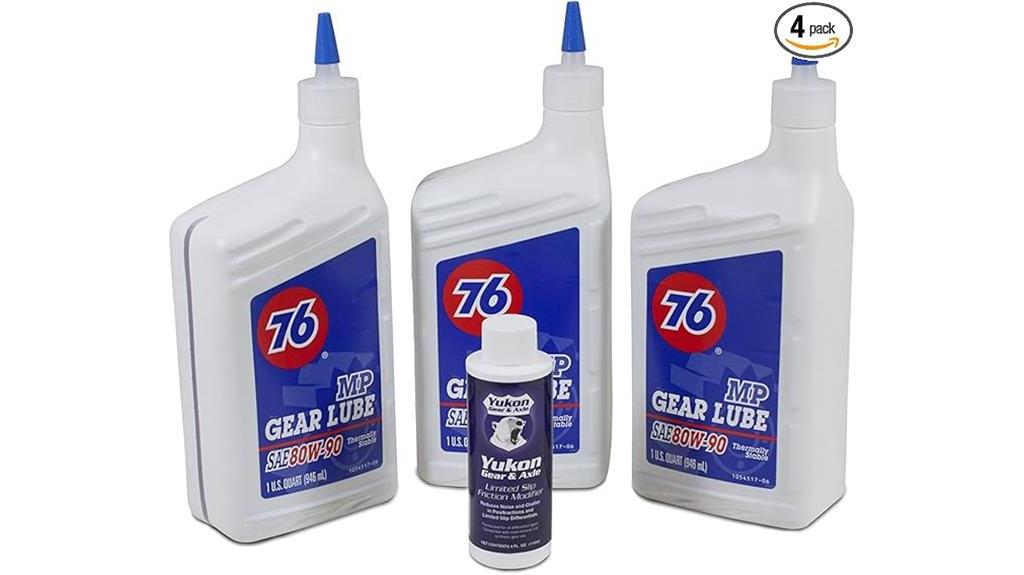
The 3 Qt. 80W90 Conventional Gear Oil with Friction Modifier Additive is an excellent choice for Ford Escape owners looking to enhance their vehicle's differential performance. This product includes three quarts of conventional oil and a 4oz bottle of Yukon Positraction additive, specifically designed for differentials. With a viscosity rating of 80W90, it offers ideal lubrication under various conditions. Yukon Gear & Axle, the trusted brand behind this product, has garnered impressive customer ratings, averaging 4.8 out of 5 stars from 412 reviews. Users appreciate its effectiveness in reducing clutch chatter and its compatibility with high mileage differentials. Although some customers noted occasional label discrepancies, the overall performance holds strong, making it a popular choice among automotive enthusiasts.
Best For: Ford Escape owners seeking to improve differential performance with high-quality gear oil.
Pros:
- Effective in reducing clutch chatter and enhancing differential performance.
- Highly rated with an average of 4.8 out of 5 stars from over 400 reviews.
- Compatible with high mileage differentials, making it suitable for older vehicles.
Cons:
- Some customers reported discrepancies in brand labels received versus what was advertised.
- Pricing concerns were mentioned by a few users, indicating it may be viewed as expensive.
- Limited availability in certain retail locations could hinder access for some buyers.
Valvoline SynPower SAE 75W-140 Full Synthetic Gear Oil 1 QT (Pack of 4)
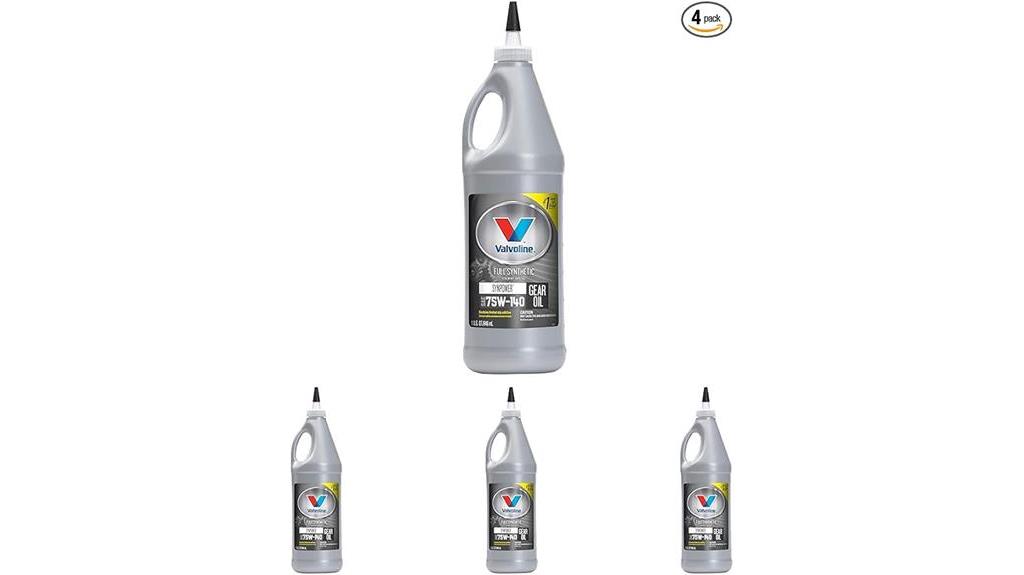
For those seeking dependable performance in extreme conditions, Valvoline SynPower SAE 75W-140 Full Synthetic Gear Oil (1 QT, Pack of 4) stands out as an excellent choice. This gear oil is specifically formulated for limited-slip hypoid differentials and is compatible with conventional lubricants. It features additives that provide rust protection, corrosion prevention, and minimize chattering in limited-slip applications. Users appreciate its excellent low-temperature protection and thermal stability, which contribute to longer service life. The packaging is user-friendly, allowing for easy pouring, making it suitable for various vehicles, including BMW and Nissan. Priced competitively, it offers good value for full synthetic gear oil, making it a preferred option for many consumers.
Best For: Those looking for high-performance gear oil suitable for both conventional and limited-slip differentials in extreme driving conditions.
Pros:
- Excellent low-temperature protection and thermal stability for enhanced durability.
- User-friendly packaging allows for easy pouring and access in tight spaces.
- Cost-effective option compared to OEM gear oils, providing good value for consumers.
Cons:
- Some users suggest improvements for easier fluid extraction from the packaging.
- Not all users may find the squeeze-style design to their liking for refilling.
- Price increases over the years may deter budget-conscious buyers.
A-Premium Rear Differential Cover with Gasket for Ford F-150 and Compatible Models
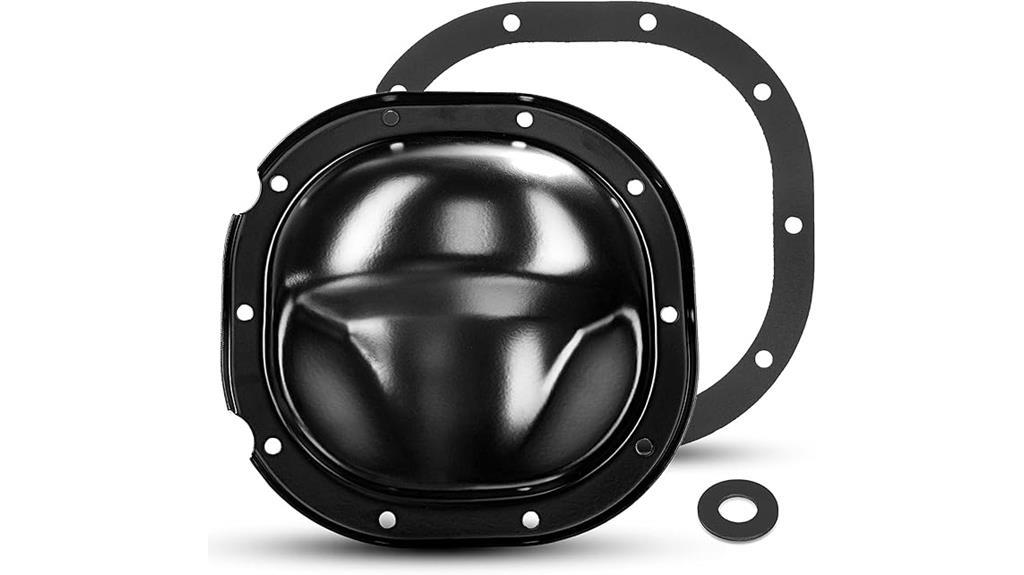
A-Premium's Rear Differential Cover with Gasket is an excellent choice for Ford F-150 owners seeking a reliable and durable replacement part. Designed to fit various models, including the F-100, Expedition, and Ranger, this cover features a robust steel construction with a sleek black finish. It accommodates an 8.8-inch ring gear and comes with a gasket included for easy installation. With a bolt count of 10, it guarantees a secure fit. Customers have praised its quality and ease of installation, noting that it fits perfectly on their vehicles without leaks. Although some users expressed concerns about the magnet's durability, overall satisfaction remains high. A-Premium offers a 30-day return guarantee through Amazon, providing peace of mind for buyers.
Best For: Ford F-150 owners looking for a high-quality and reliable rear differential cover replacement.
Pros:
- Durable steel construction ensures long-lasting performance.
- Easy installation with included gasket and secure bolt count.
- Positive customer feedback highlighting fit and quality.
Cons:
- Concerns about the durability of the magnet included.
- Some users found the cover larger than expected for their vehicles.
- Limited to specific Ford and compatible models, which may not suit all buyers.
Valvoline High Performance SAE 80W-90 Gear Oil 1 QT (Pack of 2)
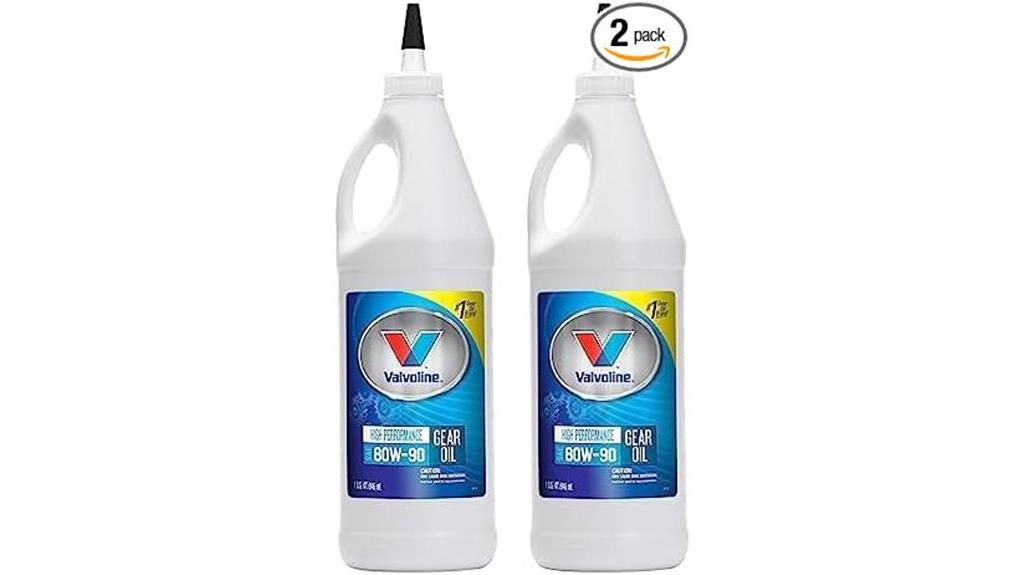
Valvoline High Performance SAE 80W-90 Gear Oil stands out as an ideal choice for Ford Escape owners seeking reliable lubrication for their differentials and non-synchronized manual transmissions. This high-performance gear oil, available in a convenient pack of two 1-quart bottles, is specially formulated for conventional hypoid differentials and provides superior protection against severe temperatures. Its extreme-pressure additives minimize gear wear from shock loads, while its 80W-90 viscosity rating guarantees excellent lubrication across various conditions. Users consistently report improved performance and satisfaction, noting the oil's durability even under heavy use. Priced competitively, Valvoline offers a solid solution for maintaining smooth operation, although caution is advised against using it in transfer cases or other unspecified applications.
Best For: Valvoline High Performance SAE 80W-90 Gear Oil is best for vehicle owners of passenger cars, light trucks, SUVs, and heavy-duty trucks seeking reliable lubrication for their differentials and non-synchronized manual transmissions.
Pros:
- Excellent protection against severe temperatures, extending service life.
- Formulated with extreme-pressure additives that minimize gear wear from shock loads.
- Positive user feedback on improved performance and durability under heavy use.
Cons:
- Not suitable for transfer cases or other applications not specified in the owner's manual.
- Some users reported packaging inconsistencies.
- May not be the best choice for vehicles requiring a different viscosity or fluid specification.
A-Premium Rear Differential Cover with Gasket for F-150 and Lincoln Vehicles
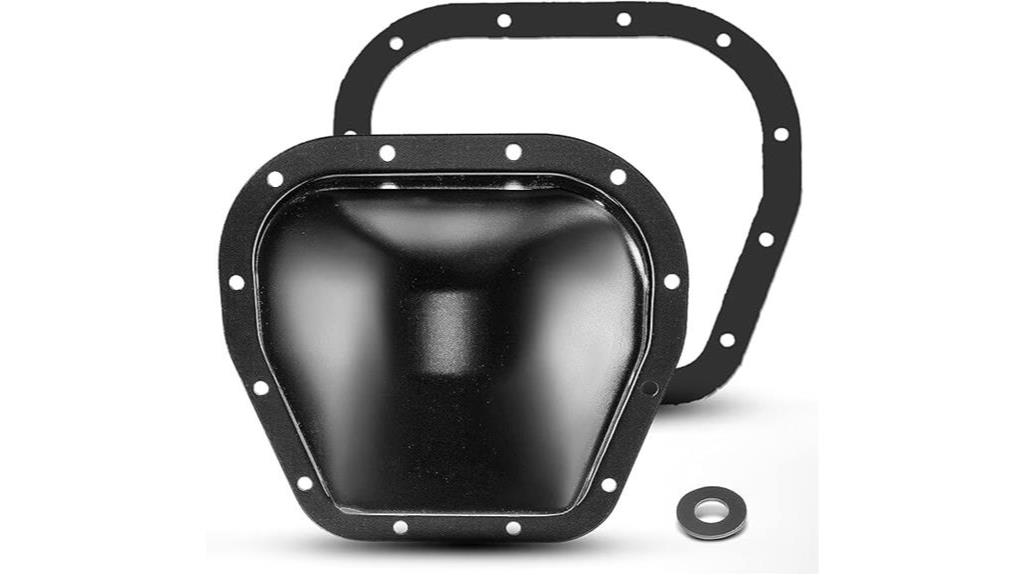
The A-Premium Rear Differential Cover, complete with a gasket, stands out as an excellent choice for Ford F-150 and Lincoln vehicle owners seeking reliable performance. This cover fits various models, including the 1997-2019 F-150 and Lincoln Navigator (1998-2002), ensuring compatibility across numerous vehicles. With a robust metal construction and a 9.75-inch ring gear, it promises durability and strength. The package includes a gasket, although some users reported alignment issues with gasket holes; flipping the gasket often resolves this. It features 12 bolt holes for secure installation and comes backed by a one-year unlimited-mileage warranty. Overall, this differential cover meets or exceeds OEM standards, making it a dependable option for maintaining peak performance in rear differentials.
Best For: The A-Premium Rear Differential Cover is best for Ford F-150 and Lincoln vehicle owners looking for a durable and compatible replacement part.
Pros:
- Sturdy metal construction ensures long-lasting performance.
- Includes gasket for a complete installation solution.
- Fits a wide range of models, providing versatility for various vehicles.
Cons:
- Potential alignment issues with gasket holes reported by some users.
- Installation may require flipping the gasket for proper fit.
- Limited to specific models, which may not suit all Ford or Lincoln vehicles.
Factors to Consider When Choosing Rear Differential Oils for Ford Escape
When choosing rear differential oils for your Ford Escape, you'll want to take into account several key factors. Pay attention to viscosity ratings, as they can affect performance under different driving conditions. Additionally, think about whether you prefer synthetic or conventional options, and make certain the oil is compatible with your vehicle model.
Viscosity Ratings Explained
Understanding viscosity ratings is important for selecting the right rear differential oil for your Ford Escape. These ratings, like 80W-90 or 75W-140, indicate the oil's thickness and performance at various temperatures. The first number represents low-temperature viscosity, while the second number indicates high-temperature viscosity.
If you see a lower first number, such as 75 in 75W-140, it means the oil flows better in cold conditions. This can be especially significant if you live in a colder climate, as it allows for easier starts and lubrication when temperatures drop. Conversely, the second number, like 90 in 80W-90, shows the oil's resistance to thinning at higher temperatures. This is essential for protecting your differential under heavy loads or during high-speed driving.
Choosing the right viscosity is crucial. Oil that's too thick might not lubricate well during cold starts, while oil that's too thin may fail to protect your differential in extreme heat. Ultimately, the viscosity you select impacts not just performance and longevity but also fuel efficiency and how smoothly your vehicle operates. Make sure you pick wisely to guarantee optimal performance for your Ford Escape.
Synthetic Vs. Conventional Options
Choosing the right rear differential oil for your Ford Escape involves more than just evaluating viscosity ratings; you also need to weigh the benefits of synthetic versus conventional options. Synthetic oils, such as those rated 75W-140, provide superior thermal stability and protection at extreme temperatures compared to conventional oils like 80W-90. If you often drive under heavy loads or in high-stress conditions, synthetic oils are your best bet to minimize wear over time.
While conventional oils may suffice for standard driving conditions, they can fall short when the going gets tough. Synthetic oils not only enhance lubrication and reduce friction through advanced additives but also extend the service life of your differential components.
Another factor to think about is oil change frequency. Synthetic oils typically allow for longer intervals between changes due to their enhanced stability and resistance to breakdown. Although they may come with a higher upfront cost, synthetic oils often prove to be more economical in the long run through better protection and reduced maintenance needs. Ultimately, evaluating your driving habits and conditions will help you choose the right oil for your Ford Escape.
Additives for Performance Improvement
The right additives in your rear differential oil can make a significant difference in performance for your Ford Escape. Choosing oils with friction modifier additives is essential, especially for limited-slip differentials. These additives minimize chattering, ensuring smoother operation under varying driving conditions.
Anti-wear additives are another important factor. They help protect your gears from scuffing and pitting, which is critical for maintaining the integrity of your differential, particularly when you're carrying heavy loads. By reducing wear, these additives contribute to the longevity of your vehicle's components.
Additionally, look for rust and corrosion inhibitors in your differential oil. These prevent the degradation of metal parts, ensuring reliable performance over time and safeguarding against potential failures.
Lastly, extreme-pressure additives are designed to handle high-stress situations. They provide extra protection against gear failure during intense driving scenarios, which is particularly beneficial if you often drive in demanding conditions.
Compatibility With Vehicle Models
Selecting the right rear differential oil for your Ford Escape goes beyond just performance additives; compatibility with your vehicle model is key. Start by confirming the oil meets the differential specifications for your Escape, which typically requires oils that conform to API GL-4 or GL-5 standards.
Next, check the viscosity rating recommended for your specific model year and drivetrain configuration. Most Ford Escapes utilize either 80W-90 or 75W-140 oils. Choosing the correct viscosity is vital for ideal lubrication and performance.
If your Ford Escape has a limited-slip differential, you'll need to take into account specific additives. These additives help prevent chattering and guarantee smooth operation, so don't overlook this aspect.
It's also essential to verify compatibility with your specific model year. Different generations of the Ford Escape may have varying requirements for differential oil, so do your homework. Finally, always review manufacturer recommendations or specifications found in your vehicle's owner manual. This will not only help you achieve ideal performance but also avoid potential warranty issues down the line.
Temperature Stability Considerations
When it comes to rear differential oils for your Ford Escape, understanding temperature stability is essential for maintaining ideal performance. Temperature fluctuations can greatly impact lubrication and protection against wear and tear, especially under varying driving conditions.
You'll want to evaluate the viscosity rating of the oil you choose. For extreme heat, oils with a higher viscosity rating, like SAE 75W-140, provide better protection. Conversely, if you're driving in colder temperatures, a lower viscosity oil like SAE 80W-90 can enhance performance.
Full synthetic oils are typically the best choice for thermal stability, as they maintain their viscosity and protective properties over a broader temperature range compared to conventional oils. Additionally, look for oils with additives designed to improve temperature stability. These additives can help prevent oxidation and breakdown at high temperatures, ultimately extending the life of both the oil and the differential components.
Packaging and Quantity Choices
Choosing the right packaging and quantity for rear differential oils can greatly impact both your maintenance experience and budget. Rear differential oils come in various packaging sizes, from single-quart bottles to multi-quart packs. If you're tackling larger maintenance jobs, opting for multi-quart options can save you money and reduce the hassle of buying multiple small bottles.
It's essential to take into account the total liquid volume required for your Ford Escape. Most rear differential systems need between 2 to 4 quarts for a complete fill, so make sure to purchase enough oil to avoid running short during your maintenance. Some brands offer bulk packaging, like packs of four one-quart containers, which can be more economical for routine maintenance.
Also, think about the packaging design. Many products come in user-friendly containers that facilitate easy pouring and minimize spills, enhancing your overall application experience. Squeeze-style containers can be particularly handy, allowing for precise pouring in tight spaces, making them perfect for DIY maintenance tasks. Overall, selecting the right packaging and quantity will streamline your process and keep your budget in check.
Price Point Assessments
Price plays an essential role in your decision-making process for rear differential oils for your Ford Escape. You'll notice that conventional oils tend to cost less than synthetic options. However, if you prioritize quality and durability, full synthetic gear oils, despite their higher price, often provide better performance and longevity.
When considering your budget, think about bulk purchasing. Buying packs of multiple quarts can offer considerable savings compared to purchasing individual containers, which is a smart move for regular maintenance.
It's also wise to compare prices across different retailers. You might find that online platforms frequently have lower prices than local stores, helping you stretch your budget further. Don't forget to keep an eye out for seasonal sales and promotions; these can greatly lower your overall costs when buying rear differential oils.
Common Questions
How Often Should I Change the Rear Differential Oil in My Ford Escape?
You should change the rear differential oil in your Ford Escape every 30,000 to 50,000 miles, depending on your driving habits and conditions. If you often drive in harsh conditions, such as towing or off-roading, consider changing it more frequently. Regular maintenance not only keeps your vehicle running smoothly but also extends the life of your differential. Always consult your owner's manual for specific recommendations tailored to your model.
Can I Use Any Oil Brand for My Ford Escape's Rear Differential?
Did you know that using the wrong oil can decrease your vehicle's performance by up to 30%? You can't just use any oil brand for your Ford Escape's rear differential. It's vital to stick to the manufacturer's specifications for viscosity and additives. Using the wrong oil can lead to increased wear and tear. Always check your owner's manual to confirm you're using the right product for peak performance and longevity.
What Are the Signs of Low Rear Differential Oil?
If you're noticing unusual noises like grinding or whirring coming from the rear differential, it might be a sign of low oil. You may also feel vibrations while driving, which can indicate insufficient lubrication. Additionally, if you see fluid leaks under your vehicle, it's a warning sign. Finally, if the rear end feels unusually hot, it's essential to check the oil level and top it up if necessary.
Is Synthetic Oil Better Than Conventional Oil for My Ford Escape?
Did you know that synthetic oils can last up to three times longer than conventional oils? When it comes to your Ford Escape, synthetic oil offers superior protection and performance. It resists breakdown under high temperatures and provides better lubrication, especially in extreme conditions. Plus, it helps improve fuel efficiency. While conventional oil might be cheaper upfront, synthetic oil can save you money in the long run by reducing wear and tear on your engine.
How Do I Know Which Viscosity Is Right for My Ford Escape?
To find the right viscosity for your Ford Escape, check the owner's manual. It'll specify the recommended oil viscosity based on your engine type and driving conditions. You can also consider your climate; for colder temperatures, a lower viscosity oil might be better, while a higher viscosity works well in warmer climates. If you're unsure, consult with a mechanic or a trusted parts store to guarantee your engine runs smoothly.
Wrapping Up
In summary, choosing the right rear differential oil for your Ford Escape is essential for peak performance and longevity. Did you know that using the proper gear oil can increase your vehicle's lifespan by up to 30%? By selecting high-quality options like Valvoline SynPower or the 80W90 Conventional Gear Oil, you're not just enhancing performance; you're also investing in your vehicle's future. Keep your Escape running smoothly by prioritizing the right lubricants!